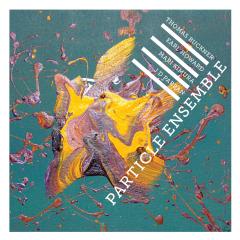PARTICLE ENSEMBLE / Particle Ensemble
Thomas Buckner (baritone voice), J D Parran (bass saxophone, alto flute, bamboo flutes, mbira), Mari Kimura (violin), Earl Howard (electronics, saxello)
Thomas Buckner, Earl Howard, Mari Kimura, and J D Parran join forces in the Particle Ensemble. The ensemble - formed after several successful collaborations - perform compositions and improvisation by its members. The three works on this release were all recorded live in concert and include a duo, a trio and a full quartet work. Compositions are by Parran and Howard, with a duo improvisation between Buckner and Howard.
A limited amount of CDR copies are also purchasable.
Listen to the entire release on Soundcloud: soundcloud.com/mutablemusic
TRACK LIST
Earl Howard: Frond (2010) (28:40)
J D Parran: Pundititis (2010) (22:52)
Thomas Buckner & Earl Howard: Duo improvisation (25:38)
REVIEWS
Grego Edwards, Gapplegate Classical - Modern Music Review, February 2013
Today another interesting item that falls somewhere between new music (concert), avant improvisation and electro-acoustic music. It's a good one from Mutable Music's download or disk series, by the Particle Ensemble (Self-Titled).
The ensemble features Thomas Buckner, baritone vocalist, who has made something of a name for himself (deservedly so) as being a fulcrum point in the improv/avant classical nexus that has been developing in new directions recently. Avant reedist J D Parran appears here on the bass sax, alto flute, bamboo flute and mbira. Mari Kimura is on violin, and Earl Howard provides the electronics and performs on saxello.
The album is in three parts, beginning with Howard's "Frond", followed by J D Parran's "Pundititus", and concluding with Buckner and Howard's "Duo Improvisation." These are live concert recordings.
The music is filled with ambiance without being the equivalent of a mood ring. Buckner's unique vocal style and excellence in both pre-planned and improvisational realms is a critical part of what goes on. J D Parran creates parts with care, a keen ear and a rich pallet of timbres. He varies between "free" sounding reedwork and more compositional lines with ease. Earl Howard brings in electronics that integrate well with the instruments yet provide complex and evocative timbres. Mari Kimura fits in with a flittingly yet communicatively free conciseness for the first work.
This is music that brings rewards for concentrated listening. The full quartet, trio and duo segments all fill the musical ear with complexity and space, narrative thrust and expressive push. The music flows more than floods. It is not without energy yet it is not energy music. It has classical parceling and improvisational interjectability.
It is highly engrossing and yet accessible on a basic level, avant without an avant aggressivity. It partakes of the sensibilities of classic AACM work and the horizontal qualities of improvisational Stockhausen, yet sounds like neither.
Excellent! I would recommend you hear this if you want to explore what good things are being done in the interstices between avant classical and avant jazz.
Daniel Barbiero, Avant Music News, March 2013
The Particle Ensemble, consisting of Thomas Buckner (baritone voice), J D Parran (bass saxophone, flutes and thumb piano), Mari Kimura (violin) and Earl Howard (electronics and saxello), seems to have gotten its name from “particle stuff,” Howard’s term for the fracturing, granular electronic manipulation he brings to the other musicians’ sounds. And on these three lengthy tracks—composition/improvisations for quartet, trio and duo respectively—Howard’s electronic interventions do indeed serve as a kind of continuo grounding the group’s collective sound.
Howard’s Frond presents an aural mosaic for the quartet, its sound shaped in turn by Parran’s bass saxophone, Buckner’s vocals, and Kimura’s violin. As the piece unfolds it arranges and rearranges itself into processed solos, duos and trios. Voices are multiplied times themselves, broken up into overlapping fragments and reassembled again. Buckner’s extended vocalizations, encompassing growls, cries and buzzes, creates a kind of timbral counterpoint to Kimura’s glisses and Parran’s serrated tones. Parran’s Pundititis opens with the composer’s thumb piano against Howard’s electronics, gradually ceding to Buckner’s Sprechstimme delivery of a politically-tinged text. As the piece continues Parran moves to flute for a lyrical solo followed by duets with Buckner and Howard’s saxello. The last track, an improvisation for Howard and Buckner, is a tour de force of the latter’s mastery of extended vocal techniques.
This is a fascinating ensemble that, in all of its different combinations, creates sounds that are as challenging as they are gratifying.

